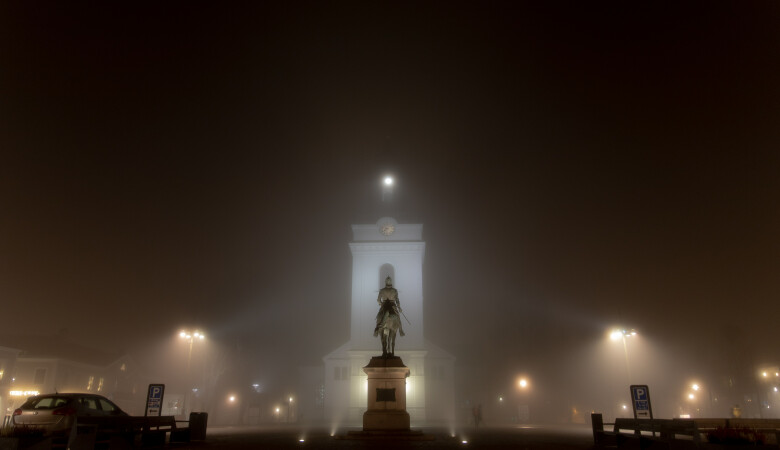The Glowing Heart of the Gospel, Part 2: Propitiation Through Christ (Romans Sermon 17 of 120)
May 07, 2000 | Andy Davis
Romans 3:21-26
Atonement, Propitiation, Animal Sacrificial System
I. Classical Illustrations: Propitiation in Action
We continue in our study in Romans and we are going to be looking, again, at Romans 3:21-26, what I call, "The glowing heart of the center of the Gospel." Now, last time, we looked at justification, the way that God declares us, we who are sinners, declares us to be righteous on judgment day. He gives us a righteousness that is not ours by faith, a righteousness from Jesus Christ, and He will not count our sins against us. That's incredibly good news and it's described right here: Justification.
Today, we're going to talk about propitiation. You may have no idea what propitiation is, but when we get done today, I hope you will. You will understand propitiation, the removal of the wrath of God from us, the wrath that we rightly deserve for our sins, the removal through faith in Christ. And next time, we're going to talk about demonstration, namely, how God's justice is demonstrated in the cross. Justification, propitiation, and demonstration; these three sermons on the focus of our faith.
Romans 3:21-26. Beginning at Verse 21, it says, "But now, a righteousness from God, apart from law, has been made known, to which the law and the prophets testify. This righteousness from God comes through faith in Jesus Christ to all who believe. There is no difference, for all have sinned, and fall short of the glory of God, and are justified freely by His grace through the redemption that came by Christ Jesus. God presented Him as a propitiation through faith in His blood. He did this to demonstrate His justice, because in His forbearance, He had left the sins committed beforehand unpunished. He did it to demonstrate His justice at the present time, so as to be just and the one who justifies those who have faith in Jesus."
Propitiation. In order to begin to get a handle of it, I'd like to go back to 400 years, 400 years before the birth of Christ, in Greece. There was a philosopher there named Socrates. I'm sure you've heard of him. Socrates, one of the greatest philosophers in human history, gathered around him a number of young disciples and was teaching them his philosophies, many of which are still with us today. And as he did this, he went on, and started to accumulate some enemies, powerful enemies in the city council where he was. And before long, he was dragged before them, and there was a trial, and he was accused of teaching false doctrines, and using those false doctrines to pervert the young people that he was teaching. The trial went on, and his enemies prevailed, and he was declared guilty, and through a turn of events, he was sentenced to death.
Death, for him, meant that he would have to drink poison; he'd have to drink a cup of hemlock. And when the day came for him to do that, he had his disciples with him. He had to drink it before the sun went down, and his disciples were gathered around him, and they were begging him to not drink it, but that rather, he should escape from the city. They would help him to escape. Others had escaped and there was no careful guard over him. It was considered a matter of honor that he would drink this hemlock, and so he really didn't have to do it, he could escape. He said, "No." He was actually very happy to do it. He had no fear of death, whatsoever. He just wanted to spend his final hours teaching his disciples, making the most of the time. So he did that, and when the time came, without any fear, without any hesitation, he drank that cup of hemlock down, and died.
Now, if you take that and contrast it with Matthew 26, the Garden of Gethsemane, we see quite a difference. Here in the Garden of Gethsemane, we see the Lord Jesus Christ, the incarnate Son of God, and it says, "Then Jesus went with His disciples to a place called Gethsemane and He said to them, 'Sit here, while I go over there and pray.' He took Peter and the two sons of Zebedee along with Him, and He began to be sorrowful and troubled. Then He said to them, 'My soul is overwhelmed with sorrow, to the point of death. Stay here and keep watch with me.' Then going a little farther, He fell with His face to the ground and prayed, 'My Father, if it is possible, let this cup be taken away, yet not as I will, but as you will.'" He prayed that same prayer three times.
He said, "Father, if it is not possible for this cup to be taken away, unless I drink it, may your will be done." And He prayed with such great earnestness, and such great zeal, that Luke tells us that drops of blood fell from His forehead to the ground. Some people have hypothesized that the intensity and the pressure in the Garden of Gethsemane was so great, that the little blood vessels right below the surface of the skin were bursting from the pressure. Whether that's true or not, you can see the intensity and the pressure in the Garden of Gethsemane, as He faced a cup.
Now, as I set these two stories side by side, I get puzzled, in a way. I say, "Here's Socrates, and with no fear at all, he just drinks this cup right down." And then we've got Jesus in Gethsemane, and there's a cup, and He is shrinking from it. He's overwhelmed with sorrow to the point of death. And I would say, "What's the difference? Was Jesus not a man of courage?" Oh, I would say, "There's never been anyone with the courage of Jesus Christ." I think, actually, Gethsemane proves it. Jesus had the most courage of any man that ever lived, and if you look at the Gospel of John, and all the times that He faced opposition, did He ever, once, shrink from telling somebody the truth, because He was afraid? Never once. He was the consummate man of courage. Then what's going on here in Gethsemane? Well, I would say the difference between those two stories, is the difference in the content of the cups.
In Socrates' cup, was physical death, but in Jesus' cup, was the wrath of God, and there's a big difference between the two. I believe that Jesus drank a cup of God's wrath for us, and He drank it to its dregs, and He knew very well that that's what He was doing. It was not death He was afraid of; it was the wrath of God.
Second story I would use to illustrate this, also comes from Greece. You've heard of Homer, he wrote "The Iliad." "The Iliad" was a story of a war over Helen of Troy. You remember that story, the face that sailed a thousand ships. She was so beautiful that the Greeks went after her to get her, and as they embarked, they ran into some difficulties. I'd like to read an account of this story from JI Packer's book, "Knowing God."
"Prince Paris had carried off Princess Helen to Troy. The Greek expeditionary force had taken ship to recover her, but was held up halfway by persistent contrary winds. Agamemnon, the Greek General, sent home for his daughter and ceremonially slaughtered her as a sacrifice, to mollify the evidently hostile gods. The move paid off; west winds blew again, and the fleet reached Troy without further difficulty. This bit of the Trojan War legend, which dates from about 1000 BC, mirrors an idea of propitiation, on which Pagan religion all over the world and in every age has been built. The idea is as follows. There are various gods, none enjoying absolute dominion, but each one with some power to make life easier or harder for you. Their temper is uniformly uncertain. They take offense at the smallest things. They get jealous, because they feel that you're paying too much attention to other gods, and other people, and not enough to themselves. And then they take it out on you, by manipulating circumstances to your hurt. The only course, at that point, is to humor and mollify them by an offering. The rule with offerings is, the bigger the better, for the gods are inclined to hold out for something sizable. In this, they are cruel and heartless, but they have the advantage, so what can you do? The wise person bows to the inevitable, and makes sure to offer something impressive enough to provide, or to produce the desired result. Human sacrifice, in particular, is expensive, but effective. Thus, Pagan religion appears as a callous commercialism, a matter of managing and manipulating your gods by cunning bribery. And within Paganism, propitiation, the appeasing of celestial bad tempers, takes its place as a regular part of life, one of the many irritating necessities that one cannot get on without.
Now, Packer goes on to say that the gods of the Greeks, like gods in Pagan religions all over the world, behave a lot more like Hollywood movie stars, than like the God of the Bible. They bicker, and they complain, and they have little feuds with one another. And in this way, we begin to think, or get the idea that, propitiation must be about as far removed from true faith, and from true Christianity, as we can imagine. But the shocking thing is, propitiation's at the center of what happened at the cross. Paul puts it right here in Verse 25, that, "God presented Him as a propitiation." The Greek word, 'hilastérion,' a propitiation, a sacrifice that turns away the wrath of God. And so we need to come to understand this message. We need to come to understand how propitiation, the removal of the wrath of God through Christ, is accomplished.
II. Controversy: Is God a God of Wrath?
And on this, we are in in somewhat of a controversy. Liberal theology denies that God has any wrath whatsoever against sin, no wrath, no anger. Basic assumption of liberal theology, in terms of the disagreement, or the problem between God and man, is that it's all a misunderstanding. If we would just know how loving God is toward all of us, how willing He is to accept us back, how gracious, and loving, and forgiving He is, then all would be well. So the real change that needs to occur is in us. We have to somehow understand this message that God is a God of love and we need to come back to Him. In this way, humanity's sins do not alienate God at all. He's not concerned about that. He's big enough to overlook all that, certainly, not angry about it. We just need to come back to God. And therefore, the cross ends up being some kind of an example of God's love, or some kind of a moral influence to win our hearts over to Him. If we just look at the love of God in the cross, our hard hearts will be broken, we'll see that God is a God of love, and we'll just come back to Him.
Is that Christianity? I would say it's not, because God is, in fact, a passionate being. And yes, He loves people. He loves them with a love you can't even measure or imagine. It's a powerful love, it's a strong love, but God loves more than just people. He also loves righteousness, He loves holiness, He loves His law, He loves commands, He loves obedience, and He created us for His glory, as we have seen. We were created for the glory of God, and when we take the glory of God, and remove it from the center of our lives, and put some earthly idol there, God is angry about that. He's a passionate being, and there is, in fact, a great deal of wrath in God's dealing with human beings, and their sin.
Now, you have seen, perhaps, a bumper sticker or something, saying "Guess who moved?" The faulty line of reasoning works this way: If there's a separation between you and God, “guess who moved?” The implication is that God never moves, that He loves you all the time, that it’s you who've moved away from God. They say if you just know that God loves you and you just come back... Well, that's true for a Christian…But a problem arises when the idea is extended to the whole world. They say, “God never moved, He's always loved us, and this way, there needed to be no change in God for our salvation, no rectification on His end. He's ready any time, if we would just come back to Him.”
Well, all of this swirling discussion in the 20th Century started to bear its fruit in Bible translations, and in 1936, one particular man, CH Dodd, focused on a word that we have here in Verse 25, just look down at it. Romans 3:25, "God presented him as," NIV gives us, "Sacrifice of atonement," with a little footnote. Footnote says, "One who would turn aside His wrath, taking away sin." They avoided the word 'propitiation,' because they figured that nobody knows what it means. Other translations, King James has 'propitiation' in there, but as they were writing new English translations, they wanted to understand it theologically properly, so they thought. And CH Dodd said this, "The meaning conveyed here is that of expiation, not propitiation." Well, I would contend that just as many people know the word 'expiation,' as know 'propitiation.' It's equally difficult, so you haven't really gained anything there. But the real issue is not the word, the issue is the meaning behind the word, because what Dodd is doing is, he's changing the translation theologically. Now, that's a problem, especially when we're in the glowing heart of the Gospel, as I contend we are.
Shortly thereafter, after Dodd's work, the RSV…You pick up an RSV and look at Romans 3:25, you will see the word 'expiation,' instead of 'propitiation.' Dodd himself was the chief translator of the New English Bible in 1961. Guess what word he put in Romans 3:25? 'Expiation.' You say, "What's the big deal?" There is a big deal. 'Expiation,' basically means cleaning or cleansing from sin, a cleansing, a purification from sin, covering, putting away, rubbing out sin, so that it's no longer an obstacle of fellowship between man and God. 'Expiation' is, in fact, cleansing. 'Propitiation' is all of that, plus the removal of the wrath that has come, as a result of that alienation. So what did Dodd leave out? The wrath. He said, "It doesn't exist. God is not a God of wrath." And so they changed from 'expiation' to 'propitiation.'
John Owen’s Four Points in Propitiation
Now, a Puritan theologian, John Owen, said that there's four points in propitiation, four things that we're looking for.
1. There has to be an offense that is taken away.
2. There has to be a person offended who needs to be pacified.
3. A person guilty of the offense.
4. Some kind of sacrifice or means to accomplish the atonement.
And all four are there in the cross of Christ. Is there an offense to be taken away? Is there an end to the offenses to be taken away, immense quantity of sin to be removed? Is there a person offended who needs to be mollified? Yes, God. God is offended by sin. He is Holy and He needs to be pacified. Is there a person guilty of the offense? Oh, yes, if you'll admit it, if you'll come and recognize that you need a Savior. Oh, yes, there's a person that needs to be forgiven. And is there a sacrifice, or a means for the removal of the wrath? Yes, His name is Jesus Christ. It's all there and that is the heart of the Gospel.
Now, what is this word 'atonement?' If you ever look at the word 'atonement' and pull it apart, what would you get? You'd get a little prefix 'at,' what's the next word? 'One,' and then that 'ment' ending, which means the way by which we can become at one with who? With God, right? That's what 'atonement' is. It's at-one-ment. We were separated from God and we needed to be brought to Him. This is 'atonement,' at-one-ment. And we are estranged from God, because of our sin, apart from Christ.
Isaiah put it this way, in Isaiah 59:1 and following, "Surely, the arm of the Lord is not too short to save, nor His ear too dull to hear, but your iniquities have separated you from God and your sins have hidden His face from you, so that He will not hear." You see, there is a problem on God's side, He won't hear. And why? Because of the sin. "For your hands are stained with blood, your fingers with guilt, your lips have spoken lies, and your tongue mutters wicked things." God is, in fact, offended with sin. He's greatly angered by it. And I would contend that, for a non-Christian, for an unbeliever, somebody who has not come to faith in Christ, the wrath of God constitutes the biggest problem in their life. Whether they feel it or not, it is the biggest problem, the biggest threat in their life.
III. Clear Biblical Doctrine: God’s Wrath a Past, Present and Future Reality
Imagine if you lived, for example, in the ancient city of Sodom or Gomorrah. You wake up in the morning, and you've been having some marital problems, squabbling with your wife, and you've got kids that are rebelling, and it's just not going the way you want, and your job is not the kind of job you want, and you feel a sense of purposelessness to your life. If only you could just have... Just some purpose, some meaning to your life. Nowadays, when we preach the Gospel, Jesus comes and does all those things for you. You see? He'll create harmony in your home. He will give you a sense of purpose. He will, perhaps, help you with your training of your children. He'll help you at the job, all of these earthly benefits. I don't deny any one of them, but is that what that resident of Sodom needs the most that day? No, he needs the removal of the wrath of God; that's his biggest problem. Suppose he worked things out with his wife. Suppose he suddenly realized that his job had meaning and there was a purpose to his life, would all be well with him? No, he's got a big problem, though he knows it not. The wrath of God; it must be removed. And I'm saying to you today, "It is removed, but it is removed only in one place: The cross of Jesus Christ. The wrath of God is removed in the cross of Christ."
Now, God's wrath is plainly a Biblical doctrine. I don't really have any idea how anyone can read through the Bible and not understand that God has wrath against sin. There are over 20, in the Old Testament, over 20 different Hebrew words used for God's anger or wrath, over 20. And if you take all of those, and add up all the times that God expresses wrath, you're at 580 occurrences, 580. Now, I've often said that, "People treat the Bible like Kroger or Winn-Dixie." You get your cart, and you just walk through, and you just see what you want. You just see what you want. You want a little of this, a little of that, and put it in your cart. Now, everything in the cart, is it from the Bible? Well, yeah, the love of God, His favor, His grace, and mercy, and forgiveness, those are there. But there's other things that you left up on the shelf, they're there too. And I don't know how you can walk through the Bible, and miss this one: 580 occurrences. Our God is a God of wrath. He hates, and He's angry about it, and He must be pacified. It is a great danger to us.
I don't need to quote illustrations from the Old Testament, just read the stories. Read the story of Korah, and Dathan, and Abiram, who led a revolt against Moses, and the Earth swallowed them up. Did Moses make the Earth open up? Did Moses have that kind of power? Isaiah described it this way, Isaiah 30:27-28, "See, the name of the Lord comes from afar with burning anger, dense clouds of smoke. His lips are full of wrath. His tongue is a consuming fire. His breath is like a rushing torrent rising up to the neck. He shakes the nations in the sieve of destruction." The past reality of God's wrath, it's back there, just read the history. It's in the Bible; it's back there. It's also a present reality, although we don't have the interpretive skill to say, "This was the wrath of God," or, "This was." Psalm 7:11, it says, "God is a righteous judge, a God who expresses His wrath every day." And Psalm 38:3, David put it this way, "Because of your wrath, there's no health in my body. My bones have no soundness, because of my sin." But even greater, is the wrath to come, the future wrath. Colossians 3:6, "Because of these sins, the wrath of God is coming." It's coming, just like it came on Sodom. It's coming and you must be ready. There is a place of safety from the wrath of God; you must find it by faith.
Now, what is the cause of God's wrath? It's always the same. What is it? What causes the wrath of God? Sin. Sin, unrighteousness. Amos 1 and 2, just look at Amos 1 and 2, "For three sins of Judah, and even for four, I will not turn back my wrath." Sin brings God's wrath.
God’s Wrath is His “Alien Task”
And yet, I will say this, that God's expressions of wrath, He calls His 'alien task.' It's alien to His central core nature. I'm not making the attributes of God argue against one another. Where there is sin, God responds with wrath and with justice. But sin is alien, isn't it? Isn't sin an interloper, an intruder into the universe that God made? As sin is alien, so also is the wrath of God alien to His original purpose. Isaiah 28:21, speaks of it this way, "The Lord will rise up, as He did at Mount Perazim. He will rouse Himself, as in the Valley of Gibeon, to do His work, His strange work, and perform His task, His alien task." That's what I'm talking about.
Our God is slow to anger, slow to anger, and abounding in loving kindness. And God does not delight in the death of the wicked. Ezekiel 33:11, "'Say to them, as surely as I live,' declares the Sovereign Lord, 'I take no pleasure in the death of the wicked, but rather, that they turn from their ways and live. Turn, turn from your ways. Why will you die, O house of Israel?'" That's coming straight from the heart of God. He is slow to anger and takes no pleasure in the death of the wicked. God's wrath is so much different than ours. His anger's so different from ours.
What makes you angry? Think about it that way. Think of the times you've expressed anger in the last week. Bumper to bumper traffic on Interstate 40, is that true? It's personal annoyance and irritation that produces wrath and anger, isn't that true? When you're put out, standing in line. Let's talk about Kroger: Standing in line, and somebody were to come and cut in front of you, what would you feel, what emotion, at that moment? How would you characterize that emotion? Could we call it anger? Maybe just small anger, so then we call it a different name, irritation. And why? Because you have been inconvenienced. Our anger is nothing like God's, nothing. And that's why we think God can't have wrath. His wrath is just different than ours; it is His passionate response to evil, and it is good, and I'm glad that He has it. I wish that I could get rid of mine, that's unrighteous, but God's anger is perfect.
Now, there is nothing we can do, whatsoever, to remove God's wrath. What can you do? Where will you go? What will you use to remove God's wrath? Therefore, God must remove it Himself. God must instruct us how His wrath is to be removed. And in the Old Testament, He does that. Remember they made the Ark of the Covenant? Remember what the Ark was? It was a golden box. And what was inside the box? Well, the 10 Commandments, the stone tablets were in there. And on the top of the box, was an atonement cover, with these cherubim with wings. And at the center, between there, is what was translated in the King James, 'the mercy seat,' the atonement cover. And in that place, God would meet with Israel. He would speak from between the cherubim. He would speak to Moses. Furthermore, the priest would go and pour out the blood of the offering. He'd pour out the blood of the sacrifice on the atonement cover between the cherubim. And so blood atonement for sin was established, and it was poured out there, at that one place. God was instructing on how His wrath could be removed.
Leviticus 16, a great chapter. You may think, "What could be in Leviticus, that I'd want to read?" You want to read Leviticus 16 concerning the day of atonement. For there, a bowl was offered for the priest, and the blood was poured out right on that atonement cover. His blood or his sin was atoned for through the blood of that beast. And then there were two goats, you remember? One of them would be slaughtered and the blood again applied to the atonement cover. One of them, however, would be the scapegoat, and the sins would be transferred onto the head of the goat, and he would be taken a distant journey away from Israel, and released. And so, a picture, a beautiful picture, of the separation from Israel and sin. God will separate sin from us, so that His wrath can be removed. It's beautiful.
A Threefold Lesson From the Sacrificial System
And so we have three lessons, a threefold lesson from the sacrificial system.
1. All sin deserves the death penalty. Well, you couldn't miss that, when you brought your offering and that beast was killed, you knew right away that sin equaled death. It was that way in the Garden of Eden, "The day you eat of it, you'll surely die." Romans 6:23, "The wages of sin is death." There's a connection between sin and death.
2. The death penalty could be paid for by a substitute. You'd bring your offering and you'd go home that day, you'd eat dinner, you'd go to sleep, you survived; the substitute died.
3. The substitute cannot be an animal. It was just a picture. That's the third lesson, it was just a picture. Can the blood of bulls and goats take away human sin? No, of course not. It pointed ahead to a sacrifice that would work. And what was that sacrifice? Jesus Christ, the incarnate Son of God. Now, He could do it. He could take away sin. And so God was teaching Israel, and teaching us through Israel, how His anger can be removed, and it's removed by sacrifice. It's removed by blood.
IV. Context in Romans
Now, that's the context in the Bible. If we look in Romans, we've seen, as we move through Romans 1:2-3, an accumulation of wrath. Have you seen it? We've been picking it up, as we've been going along. Where do we get rid of it? That's the question. We finally get to dump it down here, in the middle of Romans 3, on the cross of Christ. You look at the start, Romans 1:16, it says, "I'm not ashamed of the Gospel, because it is the power of God, for the salvation of everyone who believes." Salvation from what? Verse 18 describes that, "For the wrath of God is being revealed from Heaven, against all ungodliness and wickedness of men." There's a direct connection between Verse 16-17 and Verse 18, We need salvation from the wrath of God. Did you miss that? That's what we need salvation from, from sin and from the wrath of God.
And God has a decree, in Romans 1:32, "Even though they know God's righteous decree, that those who do such things deserve death... " The word 'death' is not just physical death, but eternal separation in hell. They not only continue to do those things, but approve of those who practice them. Romans 2:5 talks about the storing up of wrath, "But because of your stubbornness and your unrepentant heart, you're storing up wrath against yourself for the day of God's wrath, when His righteous judgment will be revealed." In Verse 8, "For those who are self-seeking, who reject the truth and follow evil, there'll be wrath and anger." How can we read this and say that, "God is not a God of wrath?" You can only do it by not reading the Bible. And therefore, if you read this, and come up with a construct in your mind of God who isn't this way, you have made what? An idol. Do you see that?
Now, what's the difference between that and somebody in Irian Jaya bowing down to some statue? There is no difference. You become an idolater, a worshipper of a false God. You're saying, "Okay, but this is heavy. What do we do with it?" There is a place for the wrath of God, it's the cross of Christ. There is a place for it. But we don't come at this problem by saying, "There is no wrath. It doesn't exist." It does exist. It's real. And we will see it. In Romans 3:5-6, "But if our unrighteousness brings out God's righteousness more clearly, what shall we say? That God is unjust in bringing His wrath on us?" Is God ever unjust? When He brings His wrath, it's deserved. It's just and it will come. And therefore, in Romans 3:9-20, we see our universal danger. We are under danger from this, because Romans 3:10, "There is no one righteous, no, not one." And so we need a savior, don't we? We need to be saved from the wrath of God. We need to not play games and say, "There isn't wrath." We need to say, "There is wrath and we need a savior."
V. Completed Atonement! Four Key Phrases
And that salvation is available in Verse 25, "God presented Him as a propitiation through faith in His blood. He did this to demonstrate His justice, because in His forbearance, He'd left the sins committed before Him unpunished." Propitiation. Now, there's four phrases here that explain our salvation. The first, "God publicly displayed Him." The second, "Displayed Him as a propitiation." The third phrase, "Through faith," And the fourth, "In His blood." Each of these four components show us how we are saved.
1. God publicly displayed Him.
When did God display Jesus as a propitiation? Well, He did it in space and time, in history, outside the walls of Jerusalem one day. It was a day of Passover, a Friday, and Jesus was nailed to the cross that day, and on that day, His blood was poured out, His hands and feet nailed to wood, and His blood poured out. And there were people watching that, weren't there? There were crowds that passed by and saw it. It was a public thing, a public display. It happened in space and time, in history, and there are records of it; we have them here in the Bible. It actually occurred. Paul put it this way, in Acts 26:26, he said to King Agrippa, "These things were not done in a corner." What does that mean, "These things were not done in a corner"? God didn't tuck His Son away in the middle of a jungle and He died for sin, He did it very publicly, in the middle of everything, in Jerusalem, so everyone could see. It was not done in a corner; it was done obviously, so we could see. "Publicly displayed Him."
But He also publicly displayed Him a different way. He publicly displays Jesus Christ as crucified every time some faithful servant of the Word preaches the Gospel. Every time someone gets up and explains this, God, again, publicly displays Jesus Christ. I get that from Galatians 3:1. Paul says there, "Before your very eyes, Jesus Christ was publicly portrayed as crucified." Well, if you look at a map, you'll see how far Galatia is from Jerusalem. They didn't see it, they weren't there, they weren't standing at the foot of the cross. Well, how then was Jesus publicly displayed before the Galatians as crucified? When Paul preached the Gospel to them. I just put the picture in your mind, didn't I? I talked about the Son of God with His hands stretched out on rough wood, and nailed, hands and feet, and His blood poured out. Do you get a picture in your mind? Doesn't it come into your mind? "Publicly displayed." Now, next week, we're going to talk about the reason for the public display, so that we could see the justice of God, but the display was public.
2. Propitiation
The second phrase, we've already talked about, and that is propitiation. The Greek word is 'hilastérion.' There's no missing it; it is a sacrifice which removes the wrath of God. And that's what Jesus is, Jesus absorbed our wrath. There was, as we've been saying all along, a transfer of guilt from us to Jesus, and then the punishment we deserve poured out on Him. God made Him, who had no sin, to be sin for us, so that we might, in Him, become the righteousness of God. The transfer happened, and then the punishment came down. Jesus knew that would happen; that was the cup in the Garden of Gethsemane, the cup of God's wrath. He knew it would happen. He knew that's exactly what was going on. Isaiah 53 knew as well, "But He was pierced for our transgressions. He was crushed for our iniquities. The punishment that brought us peace was upon Him, and by His wounds, we are healed. We all, like sheep, have gone astray. Each of us has turned to his own way and the Lord has laid on Him the iniquity of us all." Oh, what blessed verses, that our sin can be lifted from us, the guilt, all that wrath, all of it, and put on Jesus, and extinguished forever. Jesus, therefore, is like a lightning rod, which attracts the lightning bolt and draws it safely away from the one it will protect. He is our lightning rod to attract the wrath of God away from us.
Well, I just made an assumption, didn't I? I said, "He is our lighting rod." Is that good for the whole world, if every single solitary person's wrath removed? If so, then there's no hell, right? If the wrath is all gone, then there is no hell. Is there a hell? Oh, yes. Will there be people? Oh, yes. So the wrath is not removed from everyone. Well, who was it removed from? For those who, what? Believe. Those who believe.
3. Through Faith
It says, "Through faith." Through faith, we are connected to Him by faith. We are in Christ by faith, by simple trust. Don't bring your good deeds; they have no business being here. Do you think your good deeds can remove the wrath of God? Absolutely not. But by faith alone, we are connected to Jesus, and what a strong connection it is. Galatians 2:20, "I have been crucified with Christ and I no longer live, but Christ lives in me. And the life I now live in the body, I live by faith in the Son of God, who loved me, and gave Himself for me." Do you see Paul's connection there by faith? "Jesus died for me. My wrath was poured out on Him; it was my sin that He suffered for, through faith." Are you connected to the propitiation today? Are you connected to the one safe place in all the universe, when the wrath of God will be poured out here? When Heaven and Earth melts away in the heat, will you be safe, because you're connected to Jesus by faith? Oh, I pray so, through faith, simple faith, simple trust.
4. In His Blood
The final phrase: "In His blood." He's a propitiation of blood. Now, the blood, I believe, represents life taken violently, life taken by force, life given up. It's not just life itself, but life poured out. And so it says in Exodus 12-13, "The blood will be assigned for you on the houses where you are, [this is the Passover], And when I see the blood, I will pass over you." Leviticus 17:11, "For the life of a creature is in the blood, and I've given it to you to make atonement for yourselves on the altar. It is the blood that makes atonement for one's life." Blood atonement must be poured out. Hebrews 9:22, "Without the shedding of blood, there is no forgiveness." Why? Why is it true that, without the shedding of blood, there's no forgiveness? Because all sin deserves a death penalty. There must be a death. And the death is paid through Jesus Christ. Jesus' blood represents the full payment of the death penalty for all those whose places He took. Has He paid your death penalty? You have a court date and we knew that. I told you that last time. Hebrews 9:27, "It is appointed for men to die once, and then face judgment." We all have a court date. We had, at least at one time, a death penalty. Have you given it over to Jesus by faith? Has He taken it from you, the wrath paid for by His blood? I pray so.
VI. Consequences
Consequences of this doctrine: What comes out of this? First of all, human inability. There is nothing you can do to remove the wrath of God. Nothing, it's been done for you already. It's already done. It's already finished, through Jesus Christ. You must believe, simply believe, and you'll receive forgiveness. Second of all, Christ's central purpose. Why did Jesus come? He came to die, this death, the Romans 3:21-26 death. He came for this, for justification, for propitiation, and to demonstrate God's justice. He came for this. He came to drink your cup, and if He drank your cup, is there any left for you? Is there anything left for you to drink from the wrath of God? No, it's gone. The wrath is gone forever. Rejoice and be glad. The wrath of God against you for your sin is gone through your faith in Jesus Christ. There's nothing left. God will save you on the day of wrath. There will be no wrath. You will not drink and you'll not even taste it, an incredible piece of faith.
John 20, "On the evening of that first day of the week, when the disciples were together with the doors locked, for fear of the Jews, Jesus came, and stood among them, and said, 'Peace be with you.' And after He said that, He showed them His hands, and His side." Why did He do that? This is the price of peace that has been paid. "Peace be with you," He said. No more wrath, at-one-ment. It's been done. No believer in Christ need ever fear the wrath of God. It's totally gone. Jesus drank it to the bottom. Since we have now been justified through faith, we have peace with God through our Lord Jesus Christ. Romans 5:9, "Since we have now been justified by His blood, how much more shall we be saved from God's wrath through Him?" Future salvation, brothers, because the day of wrath has not come yet, but when it comes, you'll be safe.
Romans 8:1, "There is, therefore, now, no condemnation for those who are in Christ Jesus." And 1 Thessalonians 1:10, "Jesus rescues us from the coming wrath." Oh, what good news, an incredible peace of faith. But then, the incredible danger of unbelief. Do you see it? Do you see it in this doctrine? The danger of unbelief, the danger to your co-workers, the danger to your unsaved neighbors, the danger to people on the other side of the world who haven't heard of Jesus, the danger of unbelief. Do you see it? And what is the one thing that can rescue us? The Gospel. They must hear; we must tell them. If you don't know for certain that you have come out from under the wrath of God, will you come talk to me after the service? You'll have an opportunity when I finish. God will grant you life, I pray, for a few moments, to bow before Him, and to acknowledge your sinfulness, and simply say, "Lord Jesus, take my sin away. Take my sin away." Don't fail to do that. Let's pray.






























